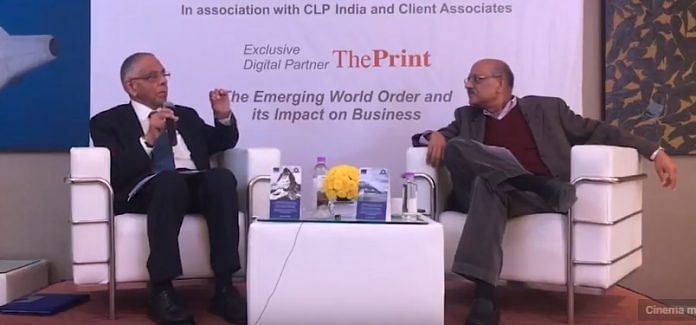The former national security advisor countered the former Foreign Secretary on a crucial Cabinet Committee on Security meeting on Siachen and Pakistan
New Delhi: Pranab Mukherjee, who was then the defence minister, made an impassioned plea to put a demilitarisation plan for the Siachen glacier on the backburner when a resolution on the issue was being brokered with Pakistan in 2006, former National Security Advisor MK Narayanan said.
Countering former Foreign Secretary Shyam Saran, who has accused Narayanan of scuttling the proposal in his new book, the former NSA said that an agreement on Siachen had remained elusive even during the crucial meeting in 2006. Narayanan was speaking with ThePrint Editor-in-Chief Shekhar Gupta at an event organised by The Outstanding Speakers’ Bureau on Thursday.
“Shyam has been less than fair to me on that. But also paints me in a great light, that I could transform what was a proposal which was already ready. One talk with the Cabinet Committee on Security changed the mindset of the army chief, of the cabinet committee members, etc. I don’t think it was all that dramatic at all,” he said.
Narayanan, who was the Intelligence Bureau chief before he took over as NSA, revealed that former president Pranab Mukherjee was supportive.
“The point is that it can’t reach an agreement till the CCS agrees that this is the situation. So it is for the CCS to say whether we reached the agreement or not. What Shyam does not say is that Pranab made a very impassioned plea at that point. He seemed to agree that we should put this on the back burner,” Narayanan said.
In his book, Saran has written that Narayanan “launched into a bitter offensive against the proposal, saying that Pakistan could not be trusted.”
Narayanan, however, said that he favours some engagement with Pakistan, even though he was known as a hawk during his tenure as NSA. Back-channel talks during the Manmohan Singh-Musharraf era, he said, yielded a lot in terms of what could be done. “We need more back-channel talks and outlay them with diplomatic relations.”
The former NSA also spoke on China’s ‘expansionist ambitions’, saying that Beijing wishes to isolate India and is seeking to win over nations which have hitherto been India’s allies in the neighbourhood. The Chinese will not attack you on land, but diplomatically win over allies, as they have tried in the case of the Maldives and Bhutan, he said.
While countries are comfortable with India politically, to the extent that they do not suspect New Delhi of having expansionist ambitions, economically most countries continue to depend on China.
“In a transactional world, it is the money that matters,” Narayanan said.
On the Adani group’s investment in Australia, Narayanan said he would not term it a strategic investment, since India has never pursued foreign investments with a strategic vision. Narayanan also spoke at length on the changing world order, and the impact of America being in retreat.
“The US is no longer interested in maintaining the world order,” he said. And for a world which has been used to US leadership for half a century, this is bound to have multiple ramifications. China’s rise is the other significant disruption in the world, Narayanan said.



